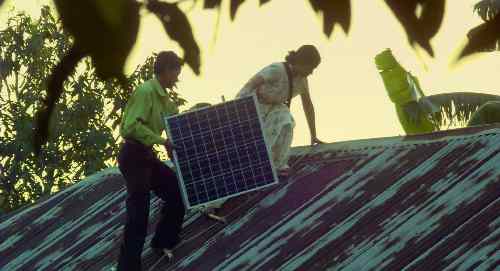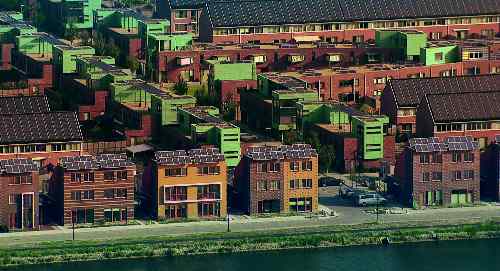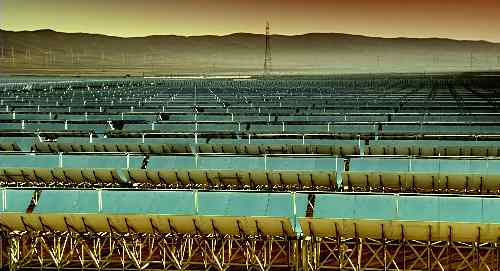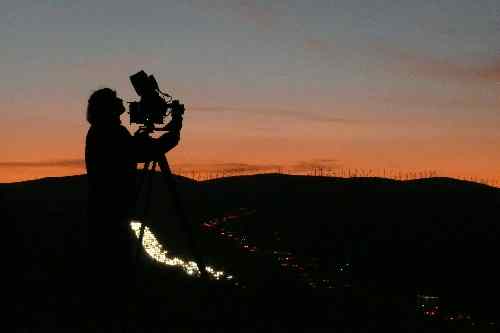Does the end of oil mean the end of civilization? Energy that is completely renewable – a utopian vision or a foreseeable future?
The debate will be held in Polish and English.
Sunday, May 8, 2011, following the screening of The 4th Revolution. Energy Autonomy. The screening will begin at 4 PM.
Film:
The 4th Revolution. Energy Autonomy
Directed by: Carl-A. Fechner
Denmark, Finland, Sweden, Italy, 2009
75 min
After the screening, the Heinrich Böll Foundation and Greenpeace Poland invite viewers to a debate with the invited guests.
Participants:
· Maciej Muskat, Director of Greenpeace Poland
· Carl-A. Fechner, filmmaker, director of The 4th Revolution. Energy Autonomy
· Paweł Poncyljusz, Member of the Polish Parliament and Poland Comes First (Polska Jest Najważniejsza) party
Piotr Aleksandrowicz, head of the Business Section in Newsweek Polska, will moderate the debate.
The contemporary world of the Western civilization is that of millions of lamps, neon lights and motorways filled with cars – its existence relies on huge amounts of energy derived from fossil fuels.
Extraction and refining of crude oil, gas and coal incurs progressive destruction of the natural environment and contributes to acceleration of climate changes. Greenhouse gas emissions must be significantly diminished for the sake of not only the present, but also the future generations. Sun, wind and water could all serve as alternative sources of energy. As all of them are natural, renewable and widely accessible, exploiting them could provide a chance for development and leveling of global discrepancies that the world run on fossil fuels only propels. Employing modern technologies to produce energy out of sun or wind power and fulfilling the potential for energetic efficiency may revolutionize the lives of millions of people worldwide.
Energy autonomy aims at immediate replacement of the expensive oil, coal and nuclear power with easily accessible and renewable sources of energy worldwide, from Africa to Los Angeles. What is necessary in order to wean humanity off fossil fuels and switch to solely renewable sources of energy is not new technology (which we already have!), but rather a change in the our way of thinking. It is necessary to understand the potential these opportunities present and to acknowledge that the revolution in the name of renewable energy sources depends on each and every one of us, and not on politicians or giant corporations. The latter are not necessarily interested in introducing any changes, perceiving them as threats to the current status quo and thereby deeming them impossible, time-consuming and expensive.
What needs to be recognized is the fact that change in behavior on the level of the individual already contributes to success. Energy revolution entails a critical structural change of the present economic structure – from a centrally-oriented system of huge suppliers of coal or oil-based energy to that basing on individual action and democratization of the energy supply enabled by the use of renewable energy sources.
Is our civilization able to renounce fossil fuels? Is achieving complete energetic independence, understood as using energy solely from renewable, widely accessible, “clean” and economically feasible sources a utopia? What kind of conditions have to be met for this revolution to take place and how long is the road that will lead us there? What opportunities are connected with such a process and how do they relate to sustainable development and socio-economic justice? What is the role of an individual in all of this? What kind of organizational, financial or – perhaps first and foremost – mental obstacles impede the energy revolution?
How should we change our way of thinking so that we look for available solutions rather than focus on potential difficulties involved? Will the next industrial revolution be an energy revolution?
The debate will be held in Polish and English
.jpg)
.jpeg)
.jpeg)
.jpeg)
Sunday, May 8, 2011, following the screening of The 4th Revolution. Energy Autonomy. The screening will begin at 4 PM.
Film:
The 4th Revolution. Energy Autonomy
Directed by: Carl-A. Fechner
Denmark, Finland, Sweden, Italy, 2009
75 min
After the screening, the Heinrich Böll Foundation and Greenpeace Poland invite viewers to a debate with the invited guests.
Participants:
· Maciej Muskat, Director of Greenpeace Poland
· Carl-A. Fechner, filmmaker, director of The 4th Revolution. Energy Autonomy
· Paweł Poncyljusz, Member of the Polish Parliament and Poland Comes First (Polska Jest Najważniejsza) party
Piotr Aleksandrowicz, head of the Business Section in Newsweek Polska, will moderate the debate.
The contemporary world of the Western civilization is that of millions of lamps, neon lights and motorways filled with cars – its existence relies on huge amounts of energy derived from fossil fuels.
Extraction and refining of crude oil, gas and coal incurs progressive destruction of the natural environment and contributes to acceleration of climate changes. Greenhouse gas emissions must be significantly diminished for the sake of not only the present, but also the future generations. Sun, wind and water could all serve as alternative sources of energy. As all of them are natural, renewable and widely accessible, exploiting them could provide a chance for development and leveling of global discrepancies that the world run on fossil fuels only propels. Employing modern technologies to produce energy out of sun or wind power and fulfilling the potential for energetic efficiency may revolutionize the lives of millions of people worldwide.
Energy autonomy aims at immediate replacement of the expensive oil, coal and nuclear power with easily accessible and renewable sources of energy worldwide, from Africa to Los Angeles. What is necessary in order to wean humanity off fossil fuels and switch to solely renewable sources of energy is not new technology (which we already have!), but rather a change in the our way of thinking. It is necessary to understand the potential these opportunities present and to acknowledge that the revolution in the name of renewable energy sources depends on each and every one of us, and not on politicians or giant corporations. The latter are not necessarily interested in introducing any changes, perceiving them as threats to the current status quo and thereby deeming them impossible, time-consuming and expensive.
What needs to be recognized is the fact that change in behavior on the level of the individual already contributes to success. Energy revolution entails a critical structural change of the present economic structure – from a centrally-oriented system of huge suppliers of coal or oil-based energy to that basing on individual action and democratization of the energy supply enabled by the use of renewable energy sources.
Is our civilization able to renounce fossil fuels? Is achieving complete energetic independence, understood as using energy solely from renewable, widely accessible, “clean” and economically feasible sources a utopia? What kind of conditions have to be met for this revolution to take place and how long is the road that will lead us there? What opportunities are connected with such a process and how do they relate to sustainable development and socio-economic justice? What is the role of an individual in all of this? What kind of organizational, financial or – perhaps first and foremost – mental obstacles impede the energy revolution?
How should we change our way of thinking so that we look for available solutions rather than focus on potential difficulties involved? Will the next industrial revolution be an energy revolution?
The debate will be held in Polish and English
.jpg)
.jpeg)







 małą ikonkę. Kliknij na nią, aby dodać ten film lub wydarzenie do swojego kalendarza.
małą ikonkę. Kliknij na nią, aby dodać ten film lub wydarzenie do swojego kalendarza.
